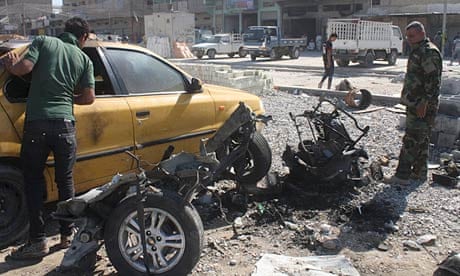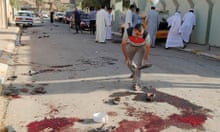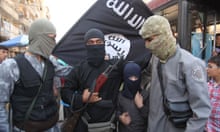A new wave of bombs tore through Baghdad on Monday, officials said, killing at least 55 people. Most of the blasts were car bombs detonated in Shia neighbourhoods, the latest of a series of co-ordinated attacks blamed on hard-line Sunni insurgents determined to rekindle large-scale sectarian conflict.
Multiple bombing strikes have hit Baghdad repeatedly over the past five months. The Shia-led government has announced new security measures, conducted counter-insurgency sweeps of areas believed to hold insurgent hideouts and sponsored political reconciliation talks, but has not significantly slowed the pace of the bombing campaign.
No group immediately claimed responsibility for the bombings, but they bore the hallmarks of al-Qaida's local branch in Iraq, known as the Islamic State of Iraq. Al-Qaida is believed to be trying to build on the Sunni minority's discontent towards what they consider second-class treatment by the government and on infighting between political groups.
"Our war with terrorism goes on," interior ministry spokesman Saad Maan told Associated Press. "Part of the problem is the political infighting and regional conflicts ... There are shortcomings and we need to develop our capabilities mainly in the intelligence-gathering efforts."
The deadliest of Monday's bombings was in the eastern Sadr City district, where a parked car bomb tore through a small vegetable market and its parking lot, killing seven people and wounding 16, a police officer said.
Other parked car bombs went off in quick succession in the Shia neighbourhoods of New Baghdad, Habibiya, Sabaa al-Bour, Kazimiyah, Shaab, Ur, Shula as well as the Sunni neighborhoods of Jamiaa and Ghazaliyah. Police officers said 44 people were killed and 139 wounded.
In the evening, a roadside bomb outside a Sunni mosque within a refinery compound in the south Baghdad district of Dora killed four and wounded 14.
Some such attacks on Sunni targets are blamed on hard-line militants targeting rival Sunnis, but there are also indications that Shiite groups have started to retaliate, raising fears of a return to the widespread sectarian killing of 2006-07.
Medical officials confirmed the casualty figures in Monday's attacks. All officials spoke on condition of anonymity because they were not authorised to talk to the media.
Iraqi security forces sealed off the sites of the attacks as firefighters struggled to extinguish fires that broke out. The twisted wreckage of cars and remnants of the car bombs littered the pavement.
Monday's attacks were the biggest since the 21 September suicide bombings that struck a cluster of funeral tents packed with mourning families in Sadr City, killing at least 104 people.
On Sunday, a series of bombings in different parts of Iraq including two suicide bombings in the country's relatively peaceful northern Kurdish region killed 46.
More than 4,500 people have been killed since April.


